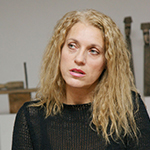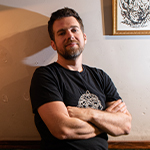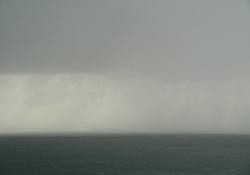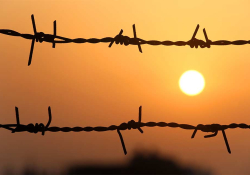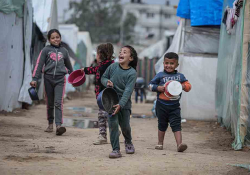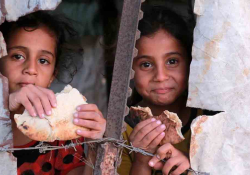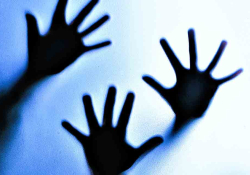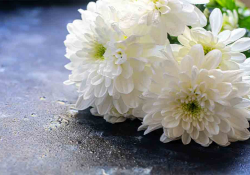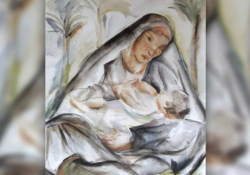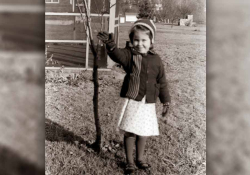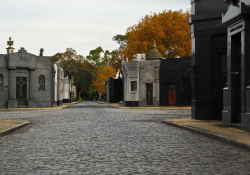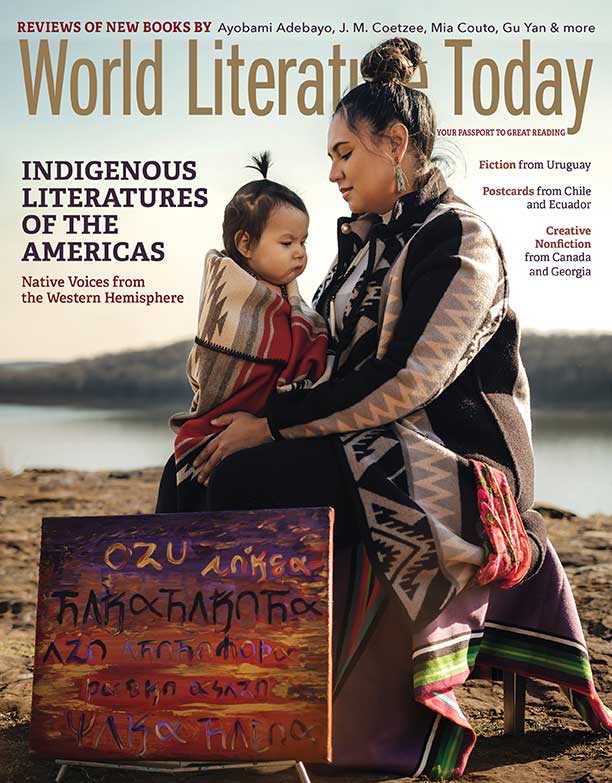The Georgian Sketchbook (an excerpt)
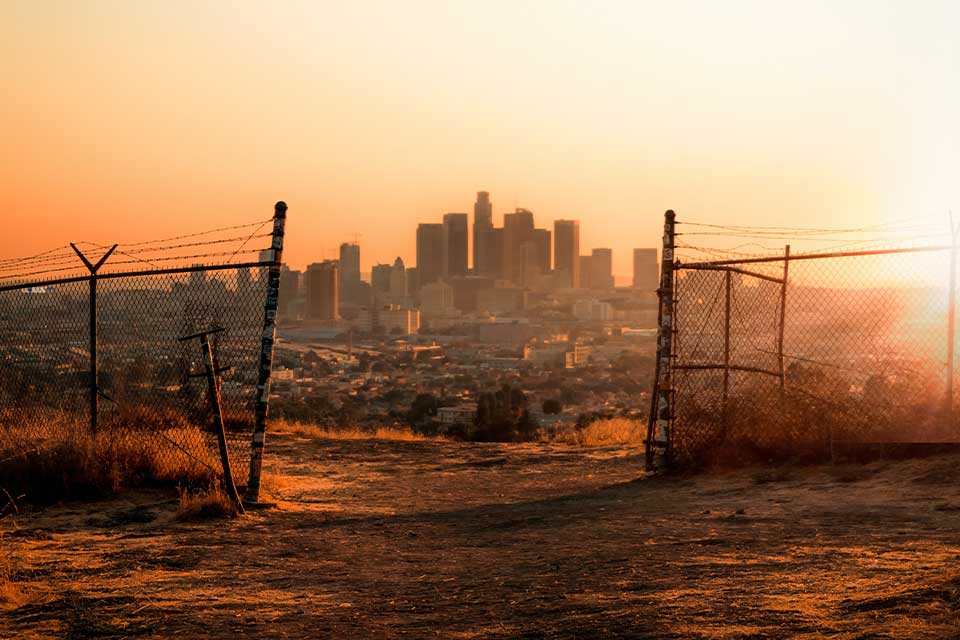
The Georgian Sketchbook is both a poet’s diary and a chronicle of a Russian war exile in Georgia. Irina Lewinsky, an executive member of the Saint Petersburg PEN Club, describes Voltskaya as “a powerful poetic voice,” a voice of conscience among Russian public figures that “speaks for those who feel shame, horror, and despair at Russia’s war in Ukraine.” Published serially in Russian on Voltskaya’s social media accounts, this prose work has attracted the attention of thousands of readers.
This message/content has been created and/or distributed by a foreign media organization acting as a foreign agent, and/or by a Russian entity acting as a foreign agent.
Three boys are chasing a plastic bucket with long sticks of bamboo. When they get bored, they start fencing. The bamboo is from the botanical garden, which is not far, on the other side of the mountain. The street climbs to the top for a long time and then drops abruptly as if exhaling. It stumbles at a small church and then continues sedately around the bend.
The children of Tbilisi play in the city’s streets, playgrounds, and parks unaccompanied by their mothers or grandmothers, on their own and with one another. A small flock of them emerges from a courtyard, overtakes me, skipping, arguing, shouting, and disappears in the next courtyard, past a clothesline of shirts and trousers dancing in the wind. I turn a corner and find another flock playing ball against a wall, clapping, jumping. It’s been a long time since I saw children play like that in Saint Petersburg. I’m glad to see them interacting in person, instead of on their phones. I recall not so much my own childhood, but my mother’s stories about playing in the courtyards during the postwar years, about her skill with balls and jump ropes—I never even came close.
The word “postwar” makes me ache inside. Someday we’ll use it about our own lives. You can’t see the war, but it’s everywhere; I can’t think of anything else. All my friends repeat the same phrase: “I can’t believe it’s true, I want to wake up.”
The word “postwar” makes me ache inside. Someday we’ll use it about our own lives.
***
I woke up in another country. I don’t like vacation stories, I don’t like selfies taken on location, and I don’t like myself in the role of tourist. There is something improper about it, a furtive debauch, voyeurism: been there, done that. Susan Sontag called it the appropriation of the seen: I was here, this is mine. Vacation snapshots remind me of a “Vasya was here” scratched into a bench. I always felt awkward on vacation—here I am, loafing around this place where people live. There’s nothing that ties me to them, neither the past nor the present, so why am I here?
I fled here from an insane dictator who is currently destroying a foreign country in my name and will undoubtedly destroy mine too in the process.
But I’m not on vacation here in Georgia. I fled here from an insane dictator who is currently destroying a foreign country in my name and will undoubtedly destroy mine too in the process. So, I think, if fate has driven me here, if this land has given me shelter, then I will try to be attentive and grateful to it. I will write a “Georgian Sketchbook,” a diary. I understand that the title is generic, but it is difficult to find a more accurate one: a diary is a look both within and without, and the eyes of a stranger sometimes notice what locals no longer see for being too plain and familiar.
The Iron Maiden
No sooner had one of our Tbilisi genii told us that sometimes the water level in the Kura River drops, exposing bankside cliffs where houses once stood long ago, than the water really did drop—so abruptly that they must’ve opened a dam downriver. An instant ago, muddy eddies of gray water pinwheeled at the bridge’s piers, and suddenly the small floating dock on the right bank had run aground and tilted over. There came a stench of rotting algae, and the drab bulks of the black cliffs crept back into the light, bearing the brick courses of ancient foundations. Time’s fetid innards had cracked. Centuries ago, when everything was different, red houses crowded the narrow river. We never got the chance, however, to imagine the people who emerged from their doorways—or how they dressed or what they sold on that bridge that’s being repaved currently. A few hours later, the floating dock has returned to its place, and the slippery monsters with the ghosts on their backs have disappeared beneath the roiling waters. The past does not like to be looked at too long.
***
When we sit in the kitchen, I look out the window, at the bronze back of King Vakhtang, and at my phone screen, where fragments of the shattered Echo of Moscow and Current Time news swirl among the kaleidoscope of YouTube channels. Russian forces approach a Ukrainian city. A gaunt, middle-aged man looks around a green courtyard and a house mangled by shells—there’s nothing to be done, he has to evacuate. “It’s a pity,” he says with a heavy sigh. He shakes his head, grimaces, and wipes his eyes, angry at his tears. “Everything we had. What a pity—eh!” He swats the air with his fist, irate. “Well, that’s all right . . .” His fist rises into the air. “That’s all right.”
I think of him all the time—and not only at the Russian embassy, which we come upon by chance, recognizing it due to the photographs of the victims of Bucha and the flowers and toys laid before them. The man forced from his city in tears is with me as I walk along Tbilisi’s streets, breathe the scent of the flowering acacias, and buy lavash from a hole-in-the-wall bakery. He and I have both been torn from our land, our roots dangling in the air. But the comparison ends there—he’s so much worse off: his land has been torn apart by bombs, mine has not. The bombs were launched at him from my side, however, and here it’s me who’s worse off. How will I look him in the eyes if we ever meet?
***
It is impossible to look at Saint Petersburg from above. Empyreal lookouts like Saint Isaac’s Cathedral don’t count—they’re just rock climbing for tourists. Walking through a horizontal city, you always see it on the same level. It’s like your life, which you can’t jump out of and see from the side. And if you can, then you must be in love and yearn so much to become someone else, the one you love, that there are rare instants when you succeed—so rare and so empyreal, that when you are suddenly transported to such a peak, your head spins and your breath abandons you. To become another is the highest form of happiness.
Vanya and I hike up the sweltering, steep road almost to the very top of the mountain until we reach a dead end with a wild building. They say it’s a palace, but it looks like a bunch of glass jars. Fortunately, a trail is visible a little lower, and we continue along the mountain ridge with relief, skirting both the glass jars and the Kartlis Deda with the ant trails of tourists at her feet. The slope is studded with fresh seedlings of thuja, cypress, and fig. The thin trees are tied to stakes of bamboo. No wonder: there is a botanical garden on the other side of the slope, and its workers are trying to firm up the soil, which threatens to give way in a landslide. Someday these trees will grow up, but I won’t live to see it. Little poppies, like flashes, line our path.
Below, under the mountain, lies the city, and every now and then we stop and dip our faces into the purple petals of its roofs arranged in large clusters. “Look,” says Vanya, “that seems to be a courtyard with a well, and over there is some kind of large street, and over there where the golden glare is, that’s Liberty Square.” The little neighborhoods breathe beneath us, flush with bushes of double lilac. We bury our faces in them. The mountain is a chance to leave the city; it’s like leaving your body and then turning to look upon it with surprise. Life assumes a different scale here—as if for a split second your gaze were one with the gaze of God. For an instant, the city becomes you and you become the city, taking it into yourself wholly and forever. It couldn’t be otherwise, for the brief instant you’re there on that peak is just that—forever.
Translation from the Russian
